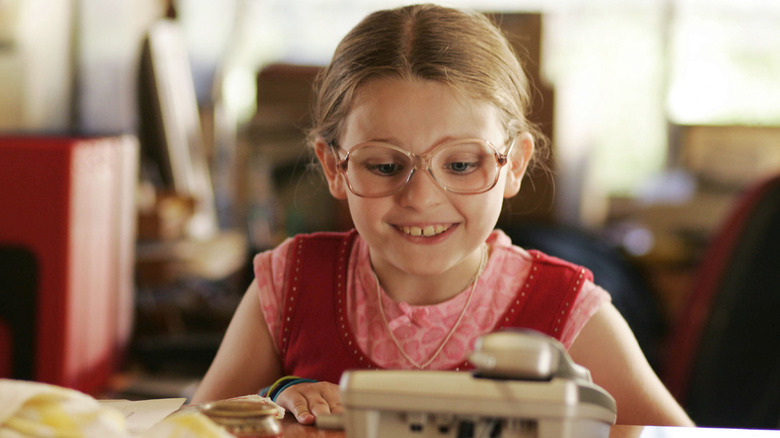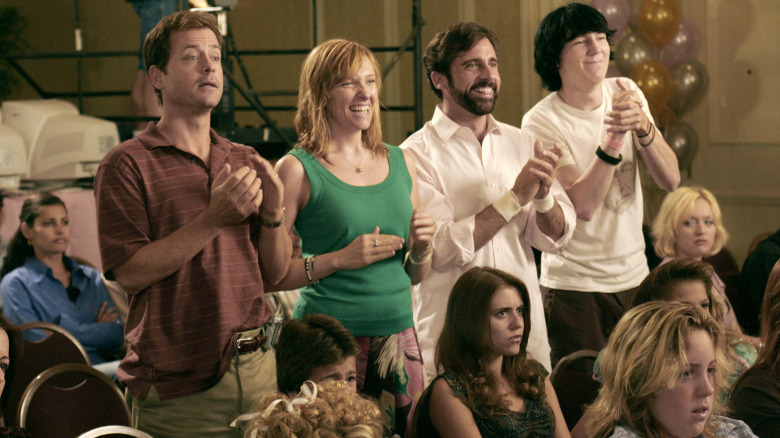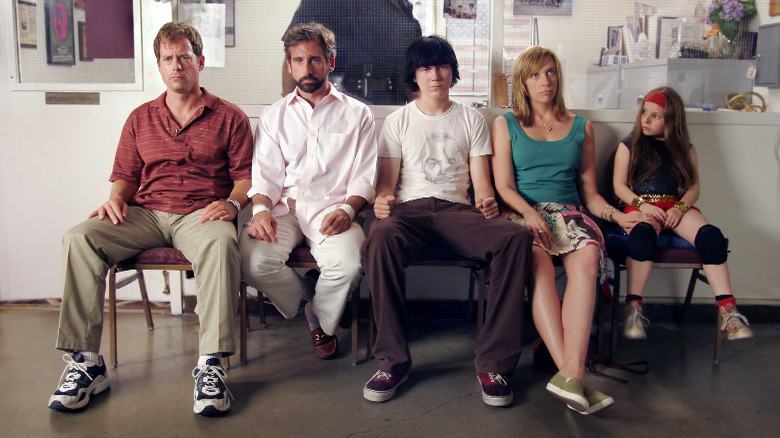Why Little Miss Sunshine Writer Michael Arndt Was Fired And Then Rehired
"Little Miss Sunshine" may be the epitome of 2000s indie quirk (in ways both good and bad), but its true legacy lies with the effect it had on the careers of its cast and crew. After all, it was the first movie to really showcase Steve Carell's range as an actor, proving he could play roles that weren't just variations on Brick Tamland and Michael Scott. It also helped to launch Paul Dano's acting career and remains one of the rare films where he doesn't get the s*** beaten out of him. (In a physical sense, at least, he still suffers his share of emotional injuries.) "Little Miss Sunshine" likewise boosted the standing of its directors, Jonathan Dayton and Valerie Faris, and snagged writer Michael Arndt an Oscar for his original script.
Arndt would go on to co-write "Toy Story 3" before co-scripting the Tom Cruise sci-fi action-thriller "Oblivion" and "The Hunger Games: Catching Fire" under the pen-name "Michael deBruyn." He's since penned the early script draft for what became "Star Wars: The Force Awakens" and wrote story material for "Inside Out," so it's not a stretch to say he's enjoyed quite the run as a Hollywood scribe. It also makes it all the more ironic that Arndt was once briefly fired from "Little Miss Sunshine."
To hear Arndt tell it (as he did in a February 2007 interview with SF360), the trouble started shortly after he sold his screenplay:
"I sold the script. The producers brought on Jonathan and Valerie and they set it up at a studio, Focus Films. Jonathan and Valerie were actually more protective of the script than I was. They really wanted to keep it the way it was. The project was at Focus for three years. To this day if you put a gun to my head and asked, 'What did Focus want you to do with the script?' I couldn't tell you. I never got a clear sense of what they wanted other than the fact that they seemed to keep pushing to want to make the script Richard's story."
'The protagonist of this movie is the whole family'
To jog your memory: "Little Miss Sunshines" centers on the Hoovers, a family of underdogs and outcasts who all reside under the same roof in Albuquerque. Their ranks include Richard (Greg Kinnear), a wannabe successful life coach; his wife Sheryl (Toni Collette), the put-upon Hoover matriarch; Sheryl's brother Frank (Carell), a queer Proust scholar who's staying with the others after trying to kill himself; Dwayne (Dano), Sheryl's solemn teen son from an earlier marriage; and Edwin (Alan Arkin), Richard's foul-mouthed father who got kicked out of a retirement home for his drug use. When Richard and Sheryl's young daughter, the upbeat Olive (Abigail Breslin), qualifies for the Little Miss Sunshine beauty pageant in California, the Hoovers all pile into their rundown Volkswagen van for a road trip that takes more than a few wild turns.
"I've always said that the protagonist of this movie is the whole family," said Arndt, adding that Focus Films wanted Richard to be the focus "so that they could get Jim Carrey or Ben Stiller to play that role." But as the writer pointed out, "Little Miss Sunshine" isn't really about Richard or his "enlightenment or awakening," as much as he begins to re-examine his belief that measurable success is the thing that gives a person's life value in the end. Rather, as Arndt put it, it's "about this family starting out separately and ending up together." This is why the film has the Hoovers teaming up to protect Olive from being humiliated during its climax at the Little Miss Sunshine pageant. Having suffered their fair share of personal hardships, they're finally unified in realizing that Oliver's emotional well-being is the only thing that matters in that moment, not the judgement of those at the contest (which itself is very f***** up anyway, to paraphrase Dwayne).
So Arndt got fired for a while
Because of this, Arndt said he "resisted" making the changes Focus Films wanted, which led to him being booted from the film:
"Focus started saying, 'Well, if Michael isn't going to make these changes, we'll fire him and get someone who will.' Jon and Val then felt pressured to turn around to say to me, 'Look, you better start changing the script. Otherwise, you're going to get fired.' I had to make a decision. I'd worked really hard to get the script to where I thought it worked — and the script that was shot was basically the script that I wrote, so I've been vindicated that it did work — but, at that time I had to decide, 'Am I going to be the guy who f***s up my own script? Or am I going to let somebody else do it?' I decided I'd much rather be fired and let somebody else do it. I didn't want to be the guy who compromised the movie and then watched it up on the screen and felt like it wasn't everything that it could have been. So I got fired off the project."
Arndt politely skipped over naming the writer who replaced him on "Little Miss Sunshine," stating that they "went in a very different direction" with the film's script and spent three to four weeks working on it. He was then brought back on after the studio underwent a change in leadership, and things went much smoother from there. Arndt assured that there really wasn't any tension between him and Dayton and Faris after that, either, calling them "heroic" for the way they went to bat for him. If anything, it sounds like getting to maintain the integrity of his script mattered more to Arndt than all the success (critical, financial, and otherwise) he got to enjoy later. That only feels right, given the message at the heart of the movie.


